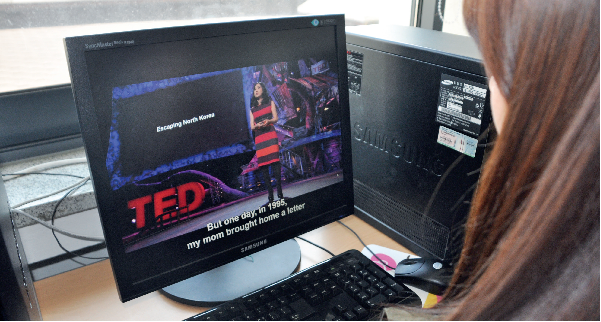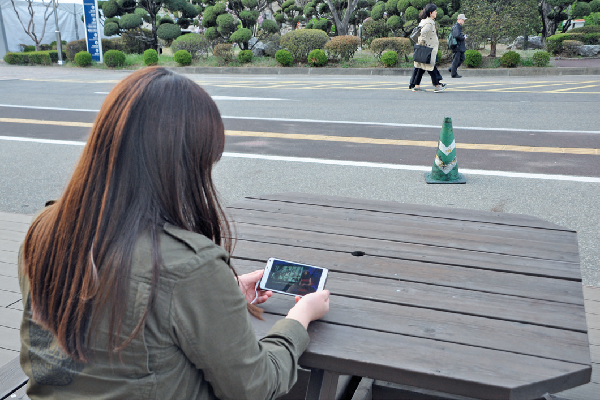
A reporter of the Sookmyung Times decided to listen to several English-mediated lectures to improve her English skills. However, she was soon shocked by the fast-paced lecture speeches by professors who spoke British English. She was also astonished by the jaw-dropping conversations between students and the professor. Most students spoke with the professor without hesitation. Therefore, she realized the need to seek new methods of improving her speaking and listening abilities. Among the methodologies available to students, she decided to listen to TED lectures and read the corresponding transcripts.
Koreans Who Have Difficulties with Spoken English
Among all the world nations, Korea ranks 11th in terms of its GDP. However, South Korea, as measured by individual TOEFL scores, ranks only midlevel in the world. In fact, Korea ranked only 89th out of 161 countries. More surprisingly, Korea only ranked 136th out of 161 in terms of TOEFL speaking scores. In Korea, people learn English for years. They start as early as kindergarten and continue with the language well into adulthood. Also, the zeal by parents for child education is so high that the demand for English-related education is huge. Positively, with all this English language learning, there are a number of Koreans now fairly fluent in the English language, but most people still avoid situations in which they are forced to interact with non-Koreans. Perhaps it is because Koreans have only approached English as another academic subject to be learnt in educational institutes. Since reporter suffered the same difficulties all Koreans encounter, she decided to study English using TED lectures. She chose TED lectures because of the diversity of the lecture types, which looked very interesting. Also, she knew she didn’t have a huge amount of time to lend to learning English by watching all episodes of an America drama, so she chose time appropriate TED lectures.

Effective Means to English Improvement
Before starting her journey to English improvement, she first downloaded a lecture onto her smartphone and planned to watch it on the subway during her commute. She felt this was the best time to view the lecture as her commute to school took roughly 1.5 hours. Becoming a second year student from this school year, her major dictates she take 5 required major courses this semester. Therefore, she does not have much free time for other activities during the school week. Hence, TED lectures were the best fit for her timetable. At first she feared turning off the English subtitles, but as she felt more comfortable with the lectures, she began to focus on the speaker’s style and tone, and the overall quality of the content, which reduced the need for reliance on subtitles and led to an improvement in her English listening skills. Later she would print out the transcripts in order to study words or expressions she was unfamiliar with. She believed this would lead to more natural conversations if she were to meet a foreigner. Honestly speaking, the study of lecture transcripts required a lot of time, but she tried to see the transcripts as spoken English. Also, she tried her best to emulate the lecturer’s pronunciation and intonation. With each attempt, she became more fluent and reached a pace similar to that of the lecturer. Through the process, she gained more confidence speaking English.

TED Lectures, Touch the Listeners’ Hearts.
Although learning from TED Talks is not without its drawbacks, such as you can only connect to the website in places that provide free Wi-Fi that works well because video-clip downloads require a lot of data usage, the advantages outweigh the disadvantages. TED Talks provides everything one needs to learn from the lectures. For examples, it offers both English and Korean scripts, subtitles, and MP4 files. Among the numerous lectures on TED, the reporter highly recommends the special lecture that details the suffering Lee Hyeonseo experienced escaping from North Korea. Briefly, as a child, Lee understood North Korea to be the best nation in which to live in the world and she spent numerous hours studying the history of Kim Ilsung. However, as she got older, she realized the truth and decided to escape from her country. Once her family was able to escape, she discovered that she had just begun the battle again. Most North Koreans arrive in South Korea with no money. Indeed, they do receive a certain amount from the international community for education, English language training, job training, and so on, but it is far from enough. At the end of the lecture, she said that she was lucky to have received so much help and that now inspires to help other North Koreans defectors. Her story and the fact that she is from both the nearest yet furthest nation from South Korea touched the heart of the reporter more than any other lecture she viewed. Still, there are plenty of other warmhearted lectures that will bring about empathy in the listener. The SMT reporter in this investigative experience is confident that Sookmyungians will improve their English skills through the interesting stories on TED Talks.


